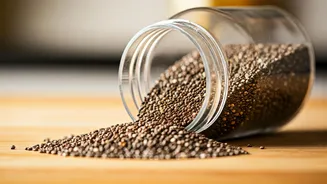Digestive Issues
People with pre-existing digestive problems need to be cautious about adding chia seeds to their diet. Because chia seeds are incredibly rich in fiber,
they can sometimes cause problems. While fiber is usually beneficial, providing the bulk needed for healthy bowel movements, it may trigger uncomfortable symptoms like bloating, gas, and abdominal cramps for those with sensitive digestive systems or conditions such as irritable bowel syndrome (IBS). It’s advisable for individuals with such sensitivities to start with a very small serving size and gradually increase intake while closely monitoring their body's reaction. Consuming a large amount of chia seeds suddenly can overwhelm the digestive system, leading to temporary discomfort.
Blood Sugar Control
Individuals managing diabetes must pay careful attention when eating chia seeds due to their impact on blood sugar levels. Chia seeds can help to lower blood sugar after meals, a benefit for those with diabetes. They can also enhance insulin sensitivity. However, this effect means that people using medication for diabetes may need to carefully monitor their blood sugar levels, especially when starting to eat chia seeds. It is extremely important to consult with a healthcare professional before adding chia seeds to a diet that already includes medication. This is to ensure that the medication dosage is adjusted to prevent hypoglycemia (very low blood sugar), which can be dangerous. Regular monitoring and expert guidance are key in ensuring chia seeds are beneficial rather than harmful for diabetic individuals.
Blood Thinning Medications
Those taking blood-thinning medications, such as warfarin, should exercise great care. Chia seeds contain omega-3 fatty acids, which also have blood-thinning properties. Taking chia seeds in addition to these medications may increase the risk of bleeding. The combination of these foods and medications can significantly thin the blood, making it more difficult for it to clot when a person is injured, increasing the risk of bruises and internal bleeding. It is crucial for anyone on these kinds of medications to discuss chia seed consumption with their doctor. They must receive guidance on how much is safe and whether adjustments to their medication are necessary. Regular blood tests may be necessary to monitor the effects and ensure safety.
Allergies and Sensitivities
Although rare, allergies to chia seeds can occur. People with known allergies to other seeds, like sesame or mustard seeds, should be cautious when trying chia seeds. Common allergic reactions include skin rashes, itching, hives, and, in severe cases, anaphylaxis, a life-threatening allergic response. The first time someone tries chia seeds, it's best to eat them in a small amount and observe their body for any symptoms. If any adverse reactions are noticed, such as digestive issues or skin reactions, they must stop consuming the seeds immediately and seek medical advice. Additionally, it is essential to check ingredient lists for hidden chia seeds, especially in processed foods, to avoid accidental consumption and allergic reactions.
Prostate Cancer Concerns
Men with prostate cancer or at high risk might need to be careful when including chia seeds in their diets. Chia seeds contain alpha-linolenic acid (ALA), a type of omega-3 fatty acid. Studies show varying results regarding ALA's impact on prostate cancer, with some suggesting a possible link to increased risk or progression. For men with existing prostate cancer, eating chia seeds could potentially influence the disease. Therefore, it is important for men, particularly those with a history of prostate issues, to discuss chia seed consumption with their healthcare provider. The provider can offer personalized advice based on their health history and the current state of their condition. This discussion helps weigh the potential benefits against possible risks.








![[WATCH] 'Real Madrid, Ramadan and rest' - Mohammed Siraj how last-minute World Cup call-up changed February plan](https://g-mob.glance-cdn.com/public/fc/image/ByYT_LEmlrD0.webp)





